Unit 5 单元综合复习课件(人教版英语八年级下册Unit 5 What were you doing when the rainstorm came?)
文档属性
| 名称 | Unit 5 单元综合复习课件(人教版英语八年级下册Unit 5 What were you doing when the rainstorm came?) |  | |
| 格式 | pptx | ||
| 文件大小 | 37.9MB | ||
| 资源类型 | 试卷 | ||
| 版本资源 | 人教新目标(Go for it)版 | ||
| 科目 | 英语 | ||
| 更新时间 | 2024-06-03 07:05:10 | ||
图片预览



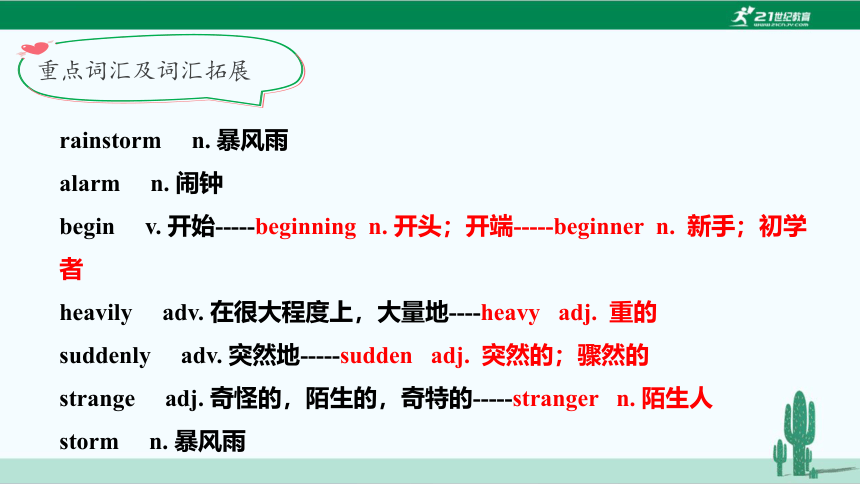
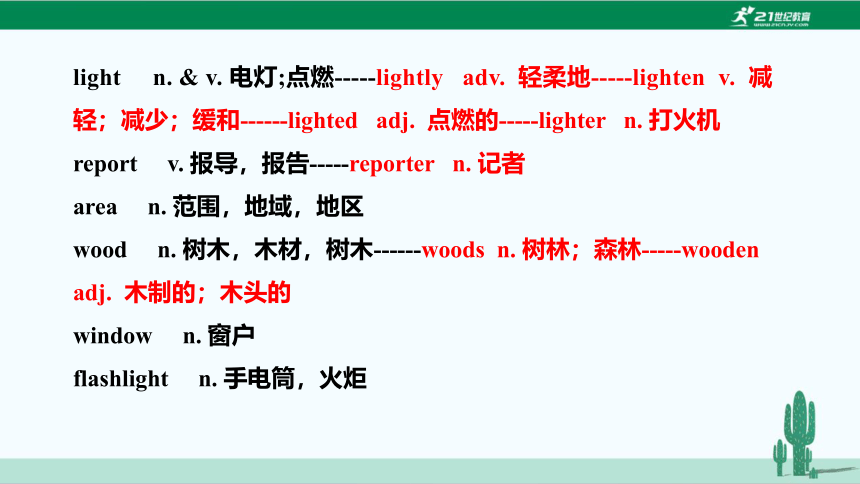
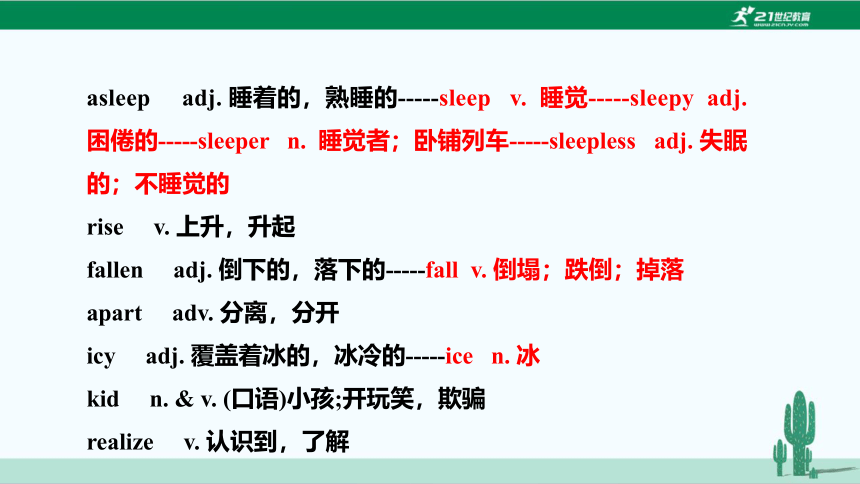
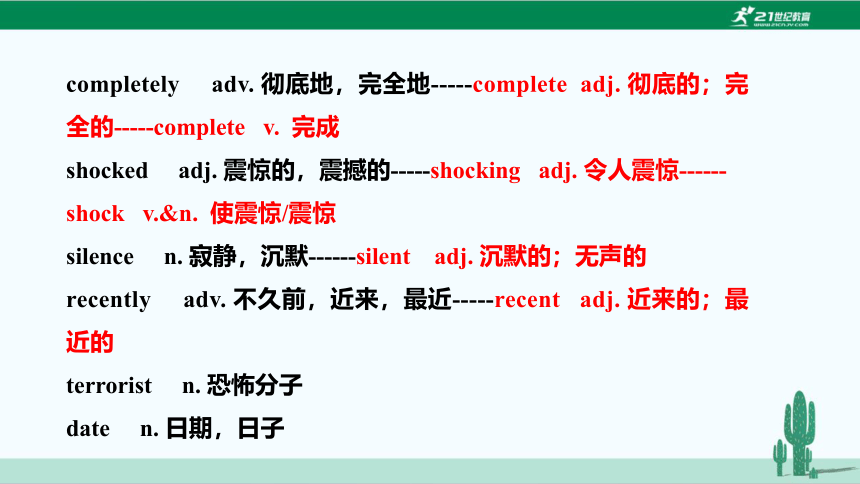
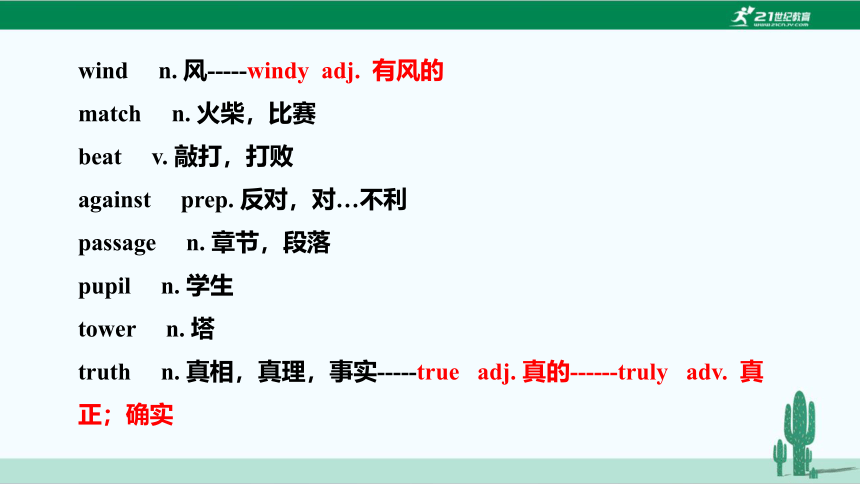
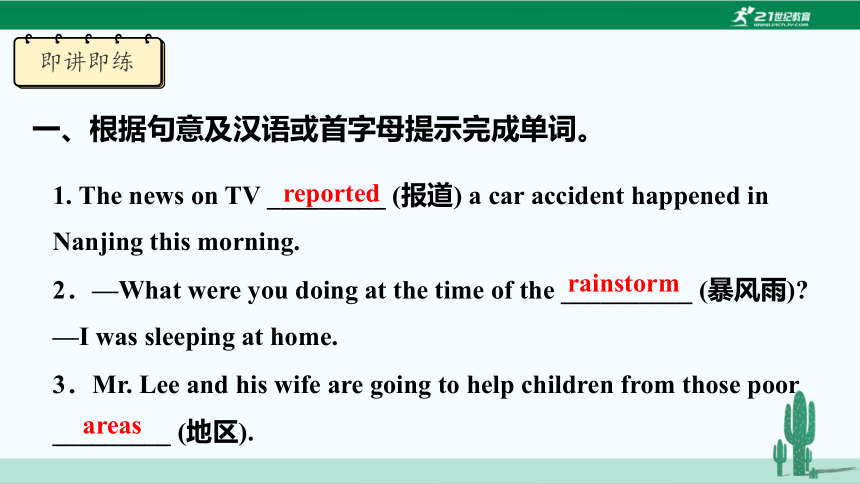
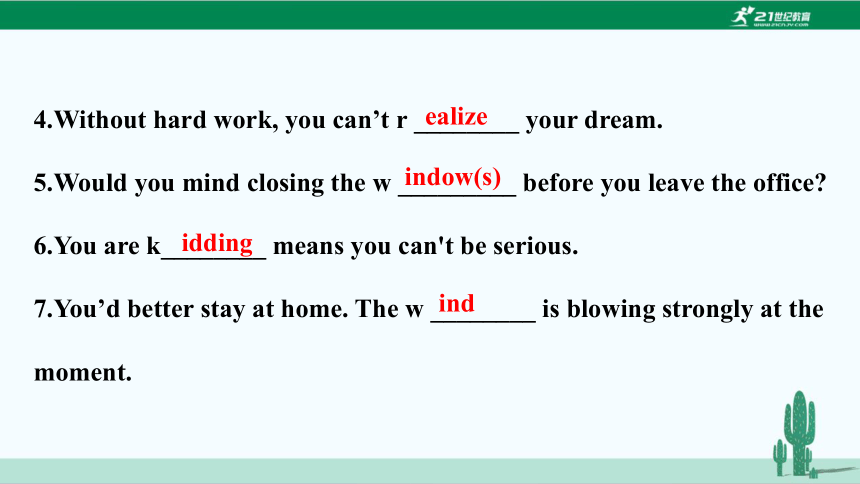
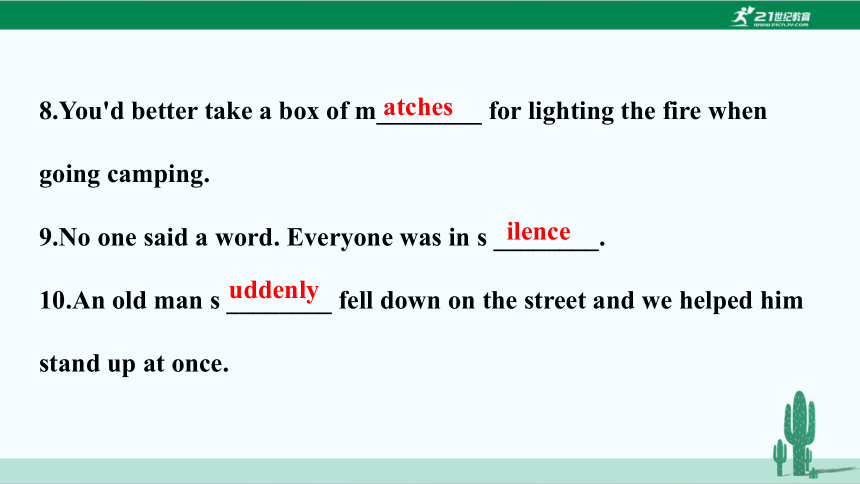
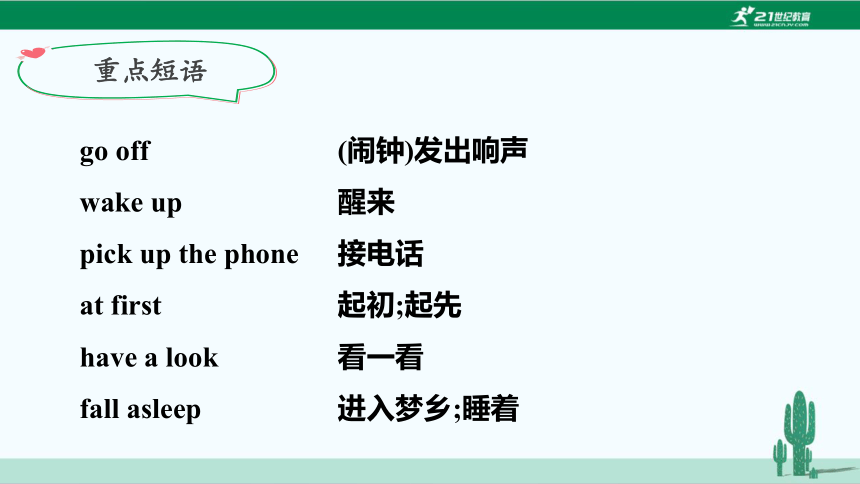
文档简介
(共72张PPT)
Unit 5 单元综合复习
人教版八年级下册
Content
词汇、短语回顾
01
重点句子回顾
02
重点词句精讲
03
语法知识精讲
04
单元话题写作
05
能力提升训练
06
目录
词汇、短语回顾
rainstorm n. 暴风雨
alarm n. 闹钟
begin v. 开始-----beginning n. 开头;开端-----beginner n. 新手;初学者
heavily adv. 在很大程度上,大量地----heavy adj. 重的
suddenly adv. 突然地-----sudden adj. 突然的;骤然的
strange adj. 奇怪的,陌生的,奇特的-----stranger n. 陌生人
storm n. 暴风雨
重点词汇及词汇拓展
light n. & v. 电灯;点燃-----lightly adv. 轻柔地-----lighten v. 减轻;减少;缓和------lighted adj. 点燃的-----lighter n. 打火机
report v. 报导,报告-----reporter n. 记者
area n. 范围,地域,地区
wood n. 树木,木材,树木------woods n. 树林;森林-----wooden adj. 木制的;木头的
window n. 窗户
flashlight n. 手电筒,火炬
asleep adj. 睡着的,熟睡的-----sleep v. 睡觉-----sleepy adj.困倦的-----sleeper n. 睡觉者;卧铺列车-----sleepless adj. 失眠的;不睡觉的
rise v. 上升,升起
fallen adj. 倒下的,落下的-----fall v. 倒塌;跌倒;掉落
apart adv. 分离,分开
icy adj. 覆盖着冰的,冰冷的-----ice n. 冰
kid n. & v. (口语)小孩;开玩笑,欺骗
realize v. 认识到,了解
completely adv. 彻底地,完全地-----complete adj. 彻底的;完全的-----complete v. 完成
shocked adj. 震惊的,震撼的-----shocking adj. 令人震惊------shock v.&n. 使震惊/震惊
silence n. 寂静,沉默------silent adj. 沉默的;无声的
recently adv. 不久前,近来,最近-----recent adj. 近来的;最近的
terrorist n. 恐怖分子
date n. 日期,日子
wind n. 风-----windy adj. 有风的
match n. 火柴,比赛
beat v. 敲打,打败
against prep. 反对,对…不利
passage n. 章节,段落
pupil n. 学生
tower n. 塔
truth n. 真相,真理,事实-----true adj. 真的------truly adv. 真正;确实
一、根据句意及汉语或首字母提示完成单词。
即讲即练
1. The news on TV _________ (报道) a car accident happened in Nanjing this morning.
2.—What were you doing at the time of the __________ (暴风雨)
—I was sleeping at home.
3.Mr. Lee and his wife are going to help children from those poor _________ (地区).
reported
rainstorm
areas
4.Without hard work, you can’t r ________ your dream.
5.Would you mind closing the w _________ before you leave the office
6.You are k________ means you can't be serious.
7.You’d better stay at home. The w ________ is blowing strongly at the moment.
indow(s)
idding
ind
ealize
8.You'd better take a box of m________ for lighting the fire when going camping.
9.No one said a word. Everyone was in s ________.
10.An old man s ________ fell down on the street and we helped him stand up at once.
atches
ilence
uddenly
go off (闹钟)发出响声
wake up 醒来
pick up the phone 接电话
at first 起初;起先
have a look 看一看
fall asleep 进入梦乡;睡着
重点短语
die down 逐渐变弱;逐渐消失
miss the bus 误了公共汽车
in a mess 一团糟
bring people closer together 使人与人之间的关系更亲近
clean up 打扫(或清除)干净
turn on the radio 打开收音机
make one’s way 前往;费力地前进
in silence 沉默;无声
point out 指出
take down 拆除;往下拽;记录
by the side of the road 在马路边
walk by 走过;路过
tell the truth 说实话
the rest of... 剩余的……
remember doing sth. 记得做了某事
look out of the window 看窗外
have trouble(in)doing sth. 做某事有困难
join a piano competition 参加钢琴比赛
即讲即练
1.当暴风雨来临时,你正在干什么?
What _________ you _________ when the rainstorm came
2.昨天他们都忙着找那个丢失的孩子。
They _________ _________ _________ for the lost kid yesterday.
3.很抱歉,张老师,今天早晨我的闹钟没有响,所以我醒得晚了。
Sorry, Mr. Zhang. My alarm clock didn't _________ _________ this morning, so I _________ _________ late.
一、根据汉语提示完成句子。
were doing
go off
were busy looking
woke up
4.昨天我给你打电话,但是你没有接。
Yesterday I called you, but you didn't _________ _________ .
5.地震发生的时候,他们正在超市购物。
They were shopping in the supermarket ____ _____ ______ ______ the earthquake.
6.当噪声逐渐消失时,我进入了梦乡。
I _________ _________ when the noise was _________ _________ .
fell asleep dying down
pick up
at the time of
7.这个男孩如此快乐,感觉像一只鸟。
The boy is so happy that he _________ _________ a bird.
8.我发现社区一片狼藉。
I found the neighborhood _________ _________ _________ .
9.让我看看你的新海报吧。
Let me _________ _________ _________ at your new poster.
feels like
in a mess
have/take a look
重点句子回顾
1. — What were you doing at eight last night 昨晚8点你在干什么?
— I was taking a shower. 我在洗淋浴。
2. When it began to rain, Ben was helping his mom make dinner. 当开始下雨的时候,本正在帮他妈妈做晚饭。
3. — What was Jenny doing while Linda was sleeping 琳达在睡觉的时候,珍妮正在干什么?
— While Linda was sleeping, Jenny was helping Mary with her homework. 琳达在睡觉的时候,珍妮正在帮玛丽做作业。
重点词句精讲
1. miss
miss作动词,意为“想念,思念”。例如:
I’ll miss you when you go toCanada.
你到了加拿大以后,我一定会想你。
【拓展】
(1) miss作动词还有“未击中,未抓住”的意思。例如:
I tried to hit the ball but I missed.
我努力地想击中球,但却未成功。
(2) miss还可意为“未赶上,错过”,是动词。例如:
I missed the football match on TV last night.
我错过了昨天晚上电视中的足球赛。
(3) miss与like; mind; finish; enjoy; practice; be busy; stop; can’t help; give up等词一样后接动词的-ing形式。例如:
I don’t want to miss seeing that film on television tonight.
我不想错过今晚在电视上看那部影片的机会。
2. suddenly
suddenly作副词,意为“突然,忽然”,在句中多修饰动词或句子,做状语。例如:
I suddenly remembered that I didn’t bring my key.
我突然想起来我没有带钥匙。
It all happened so suddenly.
一切都发生得那么突然。
3. either
(1) either作副词,意为“也不”,用在否定句中。例如:
He can’t play the violin. I can’t, either. 他不会拉小提琴,我也不会(2) either pron.(两者中)任意一个。例如:
There are many trees on either side of the street.
在街道的每一边都有很多树。
(3) either…or…为连词短语,连接两个相同的句子成分,意为“要么……要么……;或者……或者……;不是……就是……”。
例如:He either stays at home or visits friends on the weekend.
在周末,他要么待在家里,要么拜访朋友。
They will come either tomorrow or the day after tomorrow.
他们不是明天来,就是后天来。
【注意】
either…or…连接两个主语时,谓语动词的形式与紧靠谓语的那个主语的形式保持一致,即遵循就近原则。例如:
Either I or he is on duty today. 今天不是我值日,就是他值日。
4. light
(1)light作不可数名词,意为“光;光亮;光线”。例如:
The sun gives out light and heat.
太阳发出光和热。
He read the letter by the light of the candle.
他在烛光下读那封信。
(2)light作可数名词,意为“电灯;光源”。例如;
Don’t cross the road when the traffic lights are red.
当交通灯是红色时,不要横穿马路。
(3)light作形容词,意为“轻的;浅色的”。例如:
Is the box heavy or light
那箱子是重还是轻?
I like the light green dress.
我喜欢哪件浅绿色的裙子。
(4)light作动词,意为“点燃;照亮”。例如:
He sat down and lit a cigarette.
他坐下来,点了一支烟。
5. beat
beat是及物动词,有以下用法:
(1) 意为“赢;打败;战胜”,后接人或某一团队、组织等,其过去式为beat。例如:
I beat him at long jump yesterday. 昨天跳远我赢了他。
(2) 意为“打;击”,表示连续不断的打击。例如:
Who is beating the drum 谁在打鼓?
(3) 表示“(心脏)等跳动”。例如:
I feel my heart is beating fast. 我觉得我的心脏在剧烈跳动。
【拓展】
beat和win都有“赢”的意思,但用法不同:
beat的宾语为人或相当于人的团体、组织;而win的宾语为比赛或某个项目,过去式为won。例如:
Though we were weak, we beat them. 虽然我们弱,但我们赢了他们。
Who won the first prize in the competition
谁在比赛中赢得了一等奖?
6. against
against是介词,其用法如下:
(1) 反对,违反。对应的反义词为for,常用于be against sb. / sth.反对某人/某事 例如:
Are most people against having a part-time job
大多数人反对做兼职工作吗?
(2) 和……交战(指竞争、比赛等)。例如:
We’ll have a basketball match against the team from No. 2 Middle School next week.下星期我们将于二中的球队举行一场篮球赛。
(3) 碰、撞、擦。例如:
Rain beats against the window. 雨打在窗户上。
(4) 倚着、靠着。例如:
There was a ladder propped up(支撑) against the wall.一把梯子靠着墙。
(5) 防备,抗……。例如:
She saved money against old age. 她攒钱防老。
(6) 逆着……。例如:
We are sailing against the wind. 我们(的船)正逆风航行。
(7) 衬托,相映,对照。例如:
Red flags stand out brightly against the blue sky.
红旗在蓝天的衬托下显得分外鲜艳。
7. try
try作动词,意为“尝试,努力”。主要用法如下:
(1) try to do sth. 意为“设法去做某事,尽量去做某事”,其否定形式为try not to do sth.。例如:
Try not to be late again.尽量别再迟到了。
Try to get here in two hours. 尽量在两小时之内到达。
(2)try doing sth. 意为“试着做某事”,强调尝试做某事
例如:You should try eating more vegetables.你应当试着多吃点蔬菜。
(3)try one’s best to do sth. 意为“尽某人最大努力做某事”。
例如:We should try our best to finish the work on time.我们应该尽最大努力准时完成这项工作。
8. hard/hardly
hardly和hard形式上很接近,但意义截然不同。
(1)hard作形容词时,意为“困难的;硬的;勤奋的;严厉的;苛刻的”。
hard作副词时常用来表示程度,意为“努力地;猛烈地;剧烈地”。例如:
I work hard at school. 我在学校努力学习。
This ground is too hard to dig. 这块地太硬,挖不动。
They tried hard to succeed. 他们努力工作,以求得成功。
【拓展】
work hard at…意为“努力于……”。例如:
He is working hard at English. 他正在努力学习英语。
(2)hardly是表频率的副词,意为“几乎不;几乎没有”,相当于almost not,并非hard的副词形式。例如:
There is hardly any coffee left. = There’s almost no coffee left.
几乎没有剩余的咖啡了。
9. When he woke up, the sun was rising.
was rising意为“正在升起”,为过去进行时态,该时态表示在过去某时间某动作正在发生,由“助动词was/were + doing”构成。例如:
They were playing in the park.
他们正在公园里玩。
She was reading a book when I came in.
我进来时她正在看书。
10. But luckily, the driver was fine.
luckily作副词,意为“幸运地;幸亏”,做状语。例如:
Luckily,she found my book.
幸运的是,她找到了我的书。
Luckily, we caught the last train.
很幸运,我们搭上了末班火车。
【拓展】
(1)lucky作形容词,意为“幸运的;有好运的”。例如:
Some people seem to be always lucky.有些人似乎总是很幸运。
Nine is my lucky number.9是我的幸运数字。
(2)luck作不可数名词,意为“好运;幸运;运气”。例如:
I hope it will bring you luck.我希望它会给你带来好运。
Good luck to you!祝你好运!
11. The roads were icy…
icy作形容词,意为“结冰的;冰冷的;冷淡的”。例如:
It’s not easy to walk on the icy roads.
在结冰的路面上行走不容易。
Because of the icy street, they can’t drive the car.
因为街上结满了冰,他们不能开车。
Most people don’t want to swim in the icy water.
大多数人都不想在冰冷的水里游泳。
【拓展】ice作不可数名词,意为“冰”。例如:
The ice is thick enough to skate on.
这冰够厚的,可以在上面滑冰。
The boy isn’t afraid of cold. He is holding a piece of ice.
这个男孩不怕冷,手里握着一块冰。
12. But when I pointed it out to my friend…
point out意为“指出”,是“动词+副词”结构,人称代词作宾语时应放在动词之后、副词之前。例如:
There is a mistake in this sentence. Can you point it out
这个句子有一处错误,你能把它指出来吗?
He pointed out the woman from these photos.
他从这些照片中指出了那个女子。
【拓展】
(1)point作不及物动词,意为“指;指向”,常与介词at,to,towards等连用,表示“指向某位置或方向”。例如:
She pointed at me, laughing.
她指着我笑。
(2)point作可数名词,意为“点;要点”。例如:
Let’s discuss the difficult points in the passage.
让我们讨论一下文中的难点。
13. Why did you call so many times
so many 意为“那么多”,修饰复数名词,例如:
He has so many friends.
他有那么多的朋友。
There are so many people in the exhibition.
展览会上有那么多人。
语法知识精讲
when和while引导的时间状语从句
1. 延续性动词和非延续性动词
延续性动词指动作可以延续一段时间, 而不 是瞬间结束。
如: work、study、drink、eat等。
非延续性动词指动作极为短暂,瞬间结束。
如: start、begin、hit、jump、knock等。
1)when表示“当……的时候”
引导时间状语从句,从句中既可用延续性动词,又可用非延续性动词,这些动词既可以表示动作,又可表示状态。从句中动作既可和主句的动作同时发生,又可在主句的动作之前或之后发生。如:
Mary was having dinner when I saw her.我见到玛丽时,她正在吃晚饭。
The boy was still sleeping when his mother got home yesterday morning.当他妈妈来的时候,男孩还在睡觉昨天早上回家。
2)while表示“在……的时候”、“在……期间”。
它强调主句的动作与从句的动作同时发生或主句的动作发生在从句的动作过程中。While从句中必须是表示动作或状态的延续性动词。如:
The weather was fine while we were in Beijing.我们在北京的时候天气很好。
She called while I was out.我不在的时候她打电话来了。
如果主句的动作在从句的动作过程中发生,从句常用进行时
过去进行时
1. 概念: 表示过去某一时刻或某段时间内正进行的动作。
2. 构成: was/were + 动词现在分词
3. 用法:
①表示某一时刻正进行的行为,与特定的过去时间状语连用,常见的时间有: at 8 last night, at this time, at that time, at that moment 等
What were you doing at 10 yesterday morning 昨天上午10点你在做什么?
I was writing a letter to my father at that moment.那一刻我正在给父亲写信。
②表示过去某段时间内正进行的动作。
e.g. We were building a house last winter.去年冬天我们在盖房子。
They were waiting for you yesterday.他们昨天在等你。
4. 过去进行时否定句和疑问句的构成:
现以动词dance为例,其肯定式、否定式和疑问句式见下表:
肯定式 否定式 I/ He / She was dancing. We/ You/ They were dancing. I / He / It was not dancing. We / You / They were not dancing. 疑问式和简略回答 Was I dancing Yes, you were.No, you were not. Were you dancing Yes, I was.No, I wasn’t Was he/ she/ it dancing
Yes, he/ she/ it was.No, he/ she/ it wasn’t.
Were we/ you/ they dancing No, you/ we/ they weren’t. 5.现在分词的构成
一般动词在词尾加-ing,如go—going
2) 以不发音字母e结尾的动词, 先去掉e, 再加-ing
come — coming make — making write — writing
3) 以重读闭音节结尾的动词,如果末尾以一个辅
字母结尾,应先双写这个字母,再加ing,x和w结尾
的除外。
get — getting swim — swimming show — showing
4) 以字母y结尾的单词,直接加ing。如:
carrying playing studying
5) 以字母ie结尾的动词,变ie为y,再加ing。
die → dying lie →lying
6) 以元音字母加e结尾,或以e结尾,且e发音的
动词,直接加- ing。
see — seeing be — being
6. 使用进行时态的注意事项
1)一些动词,如see, hear, love, like, know,remember, understand, have等表示感情、知觉和状态的词,一般不用于进行时态。
2) 在there和here引起的句子中,常用一般现在时 代替现在进行时。
e.g. Here comes the bus.公共汽车来了。
There goes the bell.铃响了。
单元话题写作
单元话题写作
单元写作目标
此单元以“谈论过去正在发生的事情”为中心话题,讲述某一事件发生时人们正在进行的各种活动。具体到写作中,要求我们学会用相应的过去时态,如过去进行时或一般过去时,对过去发生的事情或难忘的经历进行描述。
素材积累
开头句
1. An important thing that I can’t forget is that a heavy rain hit our city last
summer.
2. I still remember what I was doing when it happened.
中间句
1. While I was doing reading, my mom was doing chores.
2. It happened on a rainy day.
3. When it happened, I was helping my father washing the car.
4. At that time, I could hardly fall asleep.
结尾句
1. It was an unforgettable day/event.
2. I really learned from this event that we should help each other in the face of difficulties.
3. It has special meaning to me.
范例
在生活中,你是否有重大的事情或难忘的经历至今记忆犹新 请以“An Unforgettable Event”为题向校杂志社投稿,描绘当时你在做什么,事情发展的原因、过程及个人感受。请你用英文写一篇80词左右的文章,回忆当时的情景。
审题
1. 文体:记叙文
2. 时态:一般过去时和过去进行时为主
3. 人称:第一人称
4. 要点提取:时间、地点、事件、原因、感受等
An Unforgettable Event
I still remember the heavy rain that hit our city last summer.It put many people in danger.
It began to rain at 5:00 in the afternoon. At that time, I was doing my homework at home. My parents were making dinner in the kitchen. And my sister was watching TV. We watched the news on TV that the heavy rain made many people hurt. Some volunteers offered to help. We wanted to do something to help them. My parents advised us to raise money for them.
Though the heavy rain caused a lot of loss, it brought people closer. I really learned from this event that we should help each other in the face of difficulties.
能力提升训练
一、用括号内所给单词的适当形式填空。
1.I kept walking for a long time, so I felt a little ________(tire) and wanted to have a rest.
2.Although it is raining __________(heavy), the policemen are still on duty in the street.
3.While I was walking in the street, a car __________ (sudden) stopped on my right.
4.Could you give me a box of _________ (match)
tired
suddenly
matches
heavily
5.Peter ___________ (play) the piano at eight o'clock last night.
6.After the rainstorm,we can see _________ (fall) trees everywhere.
7. he weather report says that it will be _________ (wind) tomorrow.
8.Where is the _________ (break) cup,Jimmy
windy
was playing
fallen
broken
二、根据句意,选择最佳选项填空。
1. After we read the newspaper, we knew the ________ about the accident.
A.plan B.advice C.truth D.decision
2. It’s very cold in Harbin. Snowing in October is nothing ________ there.
A. strange B. useful C. traditional D. natural
C
A
3. Mr. Miller fell ill and went to hospital. At that time he ________ the importance of health.
A. imagined B.wondered C.realized D.discussed
4. Bill, I planned to give you the card on Saturday, but I ________ forgot.
A. completely B. recently C. quietly D. clearly
C
A
5. Bob arrived at the train station ________ late ________ he missed the early tr ain.
A. enough; to B. too; to C. such; that D. so; that
6. —Who ________ the singing competition
—I heard Joe ________ Jill in the competition.
A. won; won B. beat; won C. won; beat D. beat; beat
D
C
三、书面表达
学校即将举办一场主题为“My Unforgettable Experience(难忘的经历)”的演讲比赛,请你根据以下提示写一篇演讲稿。
提示:1. What was the experience
2. What have you learned from it
要求:1. 80词左右; 可适当发挥。
2. 文中不能出现真实姓名、校名等信息。
My Unforgettable Experience
Looking back on the past three years, everyone had some unforgettable experiences.
Last Saturday afternoon, we had a football competition against the team from the senior class in our school. Though inferior in skills and experience, our team showed great enthusiasm and fought hard. As a member of our team, I used every chance to catch the ball and pass it on to my teammates. However, the senior team showed great skills in their performance. Unluckily, we lost the game, but we all felt satisfied as wehad gone all out on the sports field.
【参考范文】
From this experience, I’ve learned that, whenever we face challenges, we should fight hard instead of being discouraged or even giving up. Meanwhile, we should make full use of every opportunity to improve ourselves.
谢谢
21世纪教育网(www.21cnjy.com)
中小学教育资源网站
兼职招聘:
https://www.21cnjy.com/recruitment/home/admin
Unit 5 单元综合复习
人教版八年级下册
Content
词汇、短语回顾
01
重点句子回顾
02
重点词句精讲
03
语法知识精讲
04
单元话题写作
05
能力提升训练
06
目录
词汇、短语回顾
rainstorm n. 暴风雨
alarm n. 闹钟
begin v. 开始-----beginning n. 开头;开端-----beginner n. 新手;初学者
heavily adv. 在很大程度上,大量地----heavy adj. 重的
suddenly adv. 突然地-----sudden adj. 突然的;骤然的
strange adj. 奇怪的,陌生的,奇特的-----stranger n. 陌生人
storm n. 暴风雨
重点词汇及词汇拓展
light n. & v. 电灯;点燃-----lightly adv. 轻柔地-----lighten v. 减轻;减少;缓和------lighted adj. 点燃的-----lighter n. 打火机
report v. 报导,报告-----reporter n. 记者
area n. 范围,地域,地区
wood n. 树木,木材,树木------woods n. 树林;森林-----wooden adj. 木制的;木头的
window n. 窗户
flashlight n. 手电筒,火炬
asleep adj. 睡着的,熟睡的-----sleep v. 睡觉-----sleepy adj.困倦的-----sleeper n. 睡觉者;卧铺列车-----sleepless adj. 失眠的;不睡觉的
rise v. 上升,升起
fallen adj. 倒下的,落下的-----fall v. 倒塌;跌倒;掉落
apart adv. 分离,分开
icy adj. 覆盖着冰的,冰冷的-----ice n. 冰
kid n. & v. (口语)小孩;开玩笑,欺骗
realize v. 认识到,了解
completely adv. 彻底地,完全地-----complete adj. 彻底的;完全的-----complete v. 完成
shocked adj. 震惊的,震撼的-----shocking adj. 令人震惊------shock v.&n. 使震惊/震惊
silence n. 寂静,沉默------silent adj. 沉默的;无声的
recently adv. 不久前,近来,最近-----recent adj. 近来的;最近的
terrorist n. 恐怖分子
date n. 日期,日子
wind n. 风-----windy adj. 有风的
match n. 火柴,比赛
beat v. 敲打,打败
against prep. 反对,对…不利
passage n. 章节,段落
pupil n. 学生
tower n. 塔
truth n. 真相,真理,事实-----true adj. 真的------truly adv. 真正;确实
一、根据句意及汉语或首字母提示完成单词。
即讲即练
1. The news on TV _________ (报道) a car accident happened in Nanjing this morning.
2.—What were you doing at the time of the __________ (暴风雨)
—I was sleeping at home.
3.Mr. Lee and his wife are going to help children from those poor _________ (地区).
reported
rainstorm
areas
4.Without hard work, you can’t r ________ your dream.
5.Would you mind closing the w _________ before you leave the office
6.You are k________ means you can't be serious.
7.You’d better stay at home. The w ________ is blowing strongly at the moment.
indow(s)
idding
ind
ealize
8.You'd better take a box of m________ for lighting the fire when going camping.
9.No one said a word. Everyone was in s ________.
10.An old man s ________ fell down on the street and we helped him stand up at once.
atches
ilence
uddenly
go off (闹钟)发出响声
wake up 醒来
pick up the phone 接电话
at first 起初;起先
have a look 看一看
fall asleep 进入梦乡;睡着
重点短语
die down 逐渐变弱;逐渐消失
miss the bus 误了公共汽车
in a mess 一团糟
bring people closer together 使人与人之间的关系更亲近
clean up 打扫(或清除)干净
turn on the radio 打开收音机
make one’s way 前往;费力地前进
in silence 沉默;无声
point out 指出
take down 拆除;往下拽;记录
by the side of the road 在马路边
walk by 走过;路过
tell the truth 说实话
the rest of... 剩余的……
remember doing sth. 记得做了某事
look out of the window 看窗外
have trouble(in)doing sth. 做某事有困难
join a piano competition 参加钢琴比赛
即讲即练
1.当暴风雨来临时,你正在干什么?
What _________ you _________ when the rainstorm came
2.昨天他们都忙着找那个丢失的孩子。
They _________ _________ _________ for the lost kid yesterday.
3.很抱歉,张老师,今天早晨我的闹钟没有响,所以我醒得晚了。
Sorry, Mr. Zhang. My alarm clock didn't _________ _________ this morning, so I _________ _________ late.
一、根据汉语提示完成句子。
were doing
go off
were busy looking
woke up
4.昨天我给你打电话,但是你没有接。
Yesterday I called you, but you didn't _________ _________ .
5.地震发生的时候,他们正在超市购物。
They were shopping in the supermarket ____ _____ ______ ______ the earthquake.
6.当噪声逐渐消失时,我进入了梦乡。
I _________ _________ when the noise was _________ _________ .
fell asleep dying down
pick up
at the time of
7.这个男孩如此快乐,感觉像一只鸟。
The boy is so happy that he _________ _________ a bird.
8.我发现社区一片狼藉。
I found the neighborhood _________ _________ _________ .
9.让我看看你的新海报吧。
Let me _________ _________ _________ at your new poster.
feels like
in a mess
have/take a look
重点句子回顾
1. — What were you doing at eight last night 昨晚8点你在干什么?
— I was taking a shower. 我在洗淋浴。
2. When it began to rain, Ben was helping his mom make dinner. 当开始下雨的时候,本正在帮他妈妈做晚饭。
3. — What was Jenny doing while Linda was sleeping 琳达在睡觉的时候,珍妮正在干什么?
— While Linda was sleeping, Jenny was helping Mary with her homework. 琳达在睡觉的时候,珍妮正在帮玛丽做作业。
重点词句精讲
1. miss
miss作动词,意为“想念,思念”。例如:
I’ll miss you when you go toCanada.
你到了加拿大以后,我一定会想你。
【拓展】
(1) miss作动词还有“未击中,未抓住”的意思。例如:
I tried to hit the ball but I missed.
我努力地想击中球,但却未成功。
(2) miss还可意为“未赶上,错过”,是动词。例如:
I missed the football match on TV last night.
我错过了昨天晚上电视中的足球赛。
(3) miss与like; mind; finish; enjoy; practice; be busy; stop; can’t help; give up等词一样后接动词的-ing形式。例如:
I don’t want to miss seeing that film on television tonight.
我不想错过今晚在电视上看那部影片的机会。
2. suddenly
suddenly作副词,意为“突然,忽然”,在句中多修饰动词或句子,做状语。例如:
I suddenly remembered that I didn’t bring my key.
我突然想起来我没有带钥匙。
It all happened so suddenly.
一切都发生得那么突然。
3. either
(1) either作副词,意为“也不”,用在否定句中。例如:
He can’t play the violin. I can’t, either. 他不会拉小提琴,我也不会(2) either pron.(两者中)任意一个。例如:
There are many trees on either side of the street.
在街道的每一边都有很多树。
(3) either…or…为连词短语,连接两个相同的句子成分,意为“要么……要么……;或者……或者……;不是……就是……”。
例如:He either stays at home or visits friends on the weekend.
在周末,他要么待在家里,要么拜访朋友。
They will come either tomorrow or the day after tomorrow.
他们不是明天来,就是后天来。
【注意】
either…or…连接两个主语时,谓语动词的形式与紧靠谓语的那个主语的形式保持一致,即遵循就近原则。例如:
Either I or he is on duty today. 今天不是我值日,就是他值日。
4. light
(1)light作不可数名词,意为“光;光亮;光线”。例如:
The sun gives out light and heat.
太阳发出光和热。
He read the letter by the light of the candle.
他在烛光下读那封信。
(2)light作可数名词,意为“电灯;光源”。例如;
Don’t cross the road when the traffic lights are red.
当交通灯是红色时,不要横穿马路。
(3)light作形容词,意为“轻的;浅色的”。例如:
Is the box heavy or light
那箱子是重还是轻?
I like the light green dress.
我喜欢哪件浅绿色的裙子。
(4)light作动词,意为“点燃;照亮”。例如:
He sat down and lit a cigarette.
他坐下来,点了一支烟。
5. beat
beat是及物动词,有以下用法:
(1) 意为“赢;打败;战胜”,后接人或某一团队、组织等,其过去式为beat。例如:
I beat him at long jump yesterday. 昨天跳远我赢了他。
(2) 意为“打;击”,表示连续不断的打击。例如:
Who is beating the drum 谁在打鼓?
(3) 表示“(心脏)等跳动”。例如:
I feel my heart is beating fast. 我觉得我的心脏在剧烈跳动。
【拓展】
beat和win都有“赢”的意思,但用法不同:
beat的宾语为人或相当于人的团体、组织;而win的宾语为比赛或某个项目,过去式为won。例如:
Though we were weak, we beat them. 虽然我们弱,但我们赢了他们。
Who won the first prize in the competition
谁在比赛中赢得了一等奖?
6. against
against是介词,其用法如下:
(1) 反对,违反。对应的反义词为for,常用于be against sb. / sth.反对某人/某事 例如:
Are most people against having a part-time job
大多数人反对做兼职工作吗?
(2) 和……交战(指竞争、比赛等)。例如:
We’ll have a basketball match against the team from No. 2 Middle School next week.下星期我们将于二中的球队举行一场篮球赛。
(3) 碰、撞、擦。例如:
Rain beats against the window. 雨打在窗户上。
(4) 倚着、靠着。例如:
There was a ladder propped up(支撑) against the wall.一把梯子靠着墙。
(5) 防备,抗……。例如:
She saved money against old age. 她攒钱防老。
(6) 逆着……。例如:
We are sailing against the wind. 我们(的船)正逆风航行。
(7) 衬托,相映,对照。例如:
Red flags stand out brightly against the blue sky.
红旗在蓝天的衬托下显得分外鲜艳。
7. try
try作动词,意为“尝试,努力”。主要用法如下:
(1) try to do sth. 意为“设法去做某事,尽量去做某事”,其否定形式为try not to do sth.。例如:
Try not to be late again.尽量别再迟到了。
Try to get here in two hours. 尽量在两小时之内到达。
(2)try doing sth. 意为“试着做某事”,强调尝试做某事
例如:You should try eating more vegetables.你应当试着多吃点蔬菜。
(3)try one’s best to do sth. 意为“尽某人最大努力做某事”。
例如:We should try our best to finish the work on time.我们应该尽最大努力准时完成这项工作。
8. hard/hardly
hardly和hard形式上很接近,但意义截然不同。
(1)hard作形容词时,意为“困难的;硬的;勤奋的;严厉的;苛刻的”。
hard作副词时常用来表示程度,意为“努力地;猛烈地;剧烈地”。例如:
I work hard at school. 我在学校努力学习。
This ground is too hard to dig. 这块地太硬,挖不动。
They tried hard to succeed. 他们努力工作,以求得成功。
【拓展】
work hard at…意为“努力于……”。例如:
He is working hard at English. 他正在努力学习英语。
(2)hardly是表频率的副词,意为“几乎不;几乎没有”,相当于almost not,并非hard的副词形式。例如:
There is hardly any coffee left. = There’s almost no coffee left.
几乎没有剩余的咖啡了。
9. When he woke up, the sun was rising.
was rising意为“正在升起”,为过去进行时态,该时态表示在过去某时间某动作正在发生,由“助动词was/were + doing”构成。例如:
They were playing in the park.
他们正在公园里玩。
She was reading a book when I came in.
我进来时她正在看书。
10. But luckily, the driver was fine.
luckily作副词,意为“幸运地;幸亏”,做状语。例如:
Luckily,she found my book.
幸运的是,她找到了我的书。
Luckily, we caught the last train.
很幸运,我们搭上了末班火车。
【拓展】
(1)lucky作形容词,意为“幸运的;有好运的”。例如:
Some people seem to be always lucky.有些人似乎总是很幸运。
Nine is my lucky number.9是我的幸运数字。
(2)luck作不可数名词,意为“好运;幸运;运气”。例如:
I hope it will bring you luck.我希望它会给你带来好运。
Good luck to you!祝你好运!
11. The roads were icy…
icy作形容词,意为“结冰的;冰冷的;冷淡的”。例如:
It’s not easy to walk on the icy roads.
在结冰的路面上行走不容易。
Because of the icy street, they can’t drive the car.
因为街上结满了冰,他们不能开车。
Most people don’t want to swim in the icy water.
大多数人都不想在冰冷的水里游泳。
【拓展】ice作不可数名词,意为“冰”。例如:
The ice is thick enough to skate on.
这冰够厚的,可以在上面滑冰。
The boy isn’t afraid of cold. He is holding a piece of ice.
这个男孩不怕冷,手里握着一块冰。
12. But when I pointed it out to my friend…
point out意为“指出”,是“动词+副词”结构,人称代词作宾语时应放在动词之后、副词之前。例如:
There is a mistake in this sentence. Can you point it out
这个句子有一处错误,你能把它指出来吗?
He pointed out the woman from these photos.
他从这些照片中指出了那个女子。
【拓展】
(1)point作不及物动词,意为“指;指向”,常与介词at,to,towards等连用,表示“指向某位置或方向”。例如:
She pointed at me, laughing.
她指着我笑。
(2)point作可数名词,意为“点;要点”。例如:
Let’s discuss the difficult points in the passage.
让我们讨论一下文中的难点。
13. Why did you call so many times
so many 意为“那么多”,修饰复数名词,例如:
He has so many friends.
他有那么多的朋友。
There are so many people in the exhibition.
展览会上有那么多人。
语法知识精讲
when和while引导的时间状语从句
1. 延续性动词和非延续性动词
延续性动词指动作可以延续一段时间, 而不 是瞬间结束。
如: work、study、drink、eat等。
非延续性动词指动作极为短暂,瞬间结束。
如: start、begin、hit、jump、knock等。
1)when表示“当……的时候”
引导时间状语从句,从句中既可用延续性动词,又可用非延续性动词,这些动词既可以表示动作,又可表示状态。从句中动作既可和主句的动作同时发生,又可在主句的动作之前或之后发生。如:
Mary was having dinner when I saw her.我见到玛丽时,她正在吃晚饭。
The boy was still sleeping when his mother got home yesterday morning.当他妈妈来的时候,男孩还在睡觉昨天早上回家。
2)while表示“在……的时候”、“在……期间”。
它强调主句的动作与从句的动作同时发生或主句的动作发生在从句的动作过程中。While从句中必须是表示动作或状态的延续性动词。如:
The weather was fine while we were in Beijing.我们在北京的时候天气很好。
She called while I was out.我不在的时候她打电话来了。
如果主句的动作在从句的动作过程中发生,从句常用进行时
过去进行时
1. 概念: 表示过去某一时刻或某段时间内正进行的动作。
2. 构成: was/were + 动词现在分词
3. 用法:
①表示某一时刻正进行的行为,与特定的过去时间状语连用,常见的时间有: at 8 last night, at this time, at that time, at that moment 等
What were you doing at 10 yesterday morning 昨天上午10点你在做什么?
I was writing a letter to my father at that moment.那一刻我正在给父亲写信。
②表示过去某段时间内正进行的动作。
e.g. We were building a house last winter.去年冬天我们在盖房子。
They were waiting for you yesterday.他们昨天在等你。
4. 过去进行时否定句和疑问句的构成:
现以动词dance为例,其肯定式、否定式和疑问句式见下表:
肯定式 否定式 I/ He / She was dancing. We/ You/ They were dancing. I / He / It was not dancing. We / You / They were not dancing. 疑问式和简略回答 Was I dancing Yes, you were.No, you were not. Were you dancing Yes, I was.No, I wasn’t Was he/ she/ it dancing
Yes, he/ she/ it was.No, he/ she/ it wasn’t.
Were we/ you/ they dancing No, you/ we/ they weren’t. 5.现在分词的构成
一般动词在词尾加-ing,如go—going
2) 以不发音字母e结尾的动词, 先去掉e, 再加-ing
come — coming make — making write — writing
3) 以重读闭音节结尾的动词,如果末尾以一个辅
字母结尾,应先双写这个字母,再加ing,x和w结尾
的除外。
get — getting swim — swimming show — showing
4) 以字母y结尾的单词,直接加ing。如:
carrying playing studying
5) 以字母ie结尾的动词,变ie为y,再加ing。
die → dying lie →lying
6) 以元音字母加e结尾,或以e结尾,且e发音的
动词,直接加- ing。
see — seeing be — being
6. 使用进行时态的注意事项
1)一些动词,如see, hear, love, like, know,remember, understand, have等表示感情、知觉和状态的词,一般不用于进行时态。
2) 在there和here引起的句子中,常用一般现在时 代替现在进行时。
e.g. Here comes the bus.公共汽车来了。
There goes the bell.铃响了。
单元话题写作
单元话题写作
单元写作目标
此单元以“谈论过去正在发生的事情”为中心话题,讲述某一事件发生时人们正在进行的各种活动。具体到写作中,要求我们学会用相应的过去时态,如过去进行时或一般过去时,对过去发生的事情或难忘的经历进行描述。
素材积累
开头句
1. An important thing that I can’t forget is that a heavy rain hit our city last
summer.
2. I still remember what I was doing when it happened.
中间句
1. While I was doing reading, my mom was doing chores.
2. It happened on a rainy day.
3. When it happened, I was helping my father washing the car.
4. At that time, I could hardly fall asleep.
结尾句
1. It was an unforgettable day/event.
2. I really learned from this event that we should help each other in the face of difficulties.
3. It has special meaning to me.
范例
在生活中,你是否有重大的事情或难忘的经历至今记忆犹新 请以“An Unforgettable Event”为题向校杂志社投稿,描绘当时你在做什么,事情发展的原因、过程及个人感受。请你用英文写一篇80词左右的文章,回忆当时的情景。
审题
1. 文体:记叙文
2. 时态:一般过去时和过去进行时为主
3. 人称:第一人称
4. 要点提取:时间、地点、事件、原因、感受等
An Unforgettable Event
I still remember the heavy rain that hit our city last summer.It put many people in danger.
It began to rain at 5:00 in the afternoon. At that time, I was doing my homework at home. My parents were making dinner in the kitchen. And my sister was watching TV. We watched the news on TV that the heavy rain made many people hurt. Some volunteers offered to help. We wanted to do something to help them. My parents advised us to raise money for them.
Though the heavy rain caused a lot of loss, it brought people closer. I really learned from this event that we should help each other in the face of difficulties.
能力提升训练
一、用括号内所给单词的适当形式填空。
1.I kept walking for a long time, so I felt a little ________(tire) and wanted to have a rest.
2.Although it is raining __________(heavy), the policemen are still on duty in the street.
3.While I was walking in the street, a car __________ (sudden) stopped on my right.
4.Could you give me a box of _________ (match)
tired
suddenly
matches
heavily
5.Peter ___________ (play) the piano at eight o'clock last night.
6.After the rainstorm,we can see _________ (fall) trees everywhere.
7. he weather report says that it will be _________ (wind) tomorrow.
8.Where is the _________ (break) cup,Jimmy
windy
was playing
fallen
broken
二、根据句意,选择最佳选项填空。
1. After we read the newspaper, we knew the ________ about the accident.
A.plan B.advice C.truth D.decision
2. It’s very cold in Harbin. Snowing in October is nothing ________ there.
A. strange B. useful C. traditional D. natural
C
A
3. Mr. Miller fell ill and went to hospital. At that time he ________ the importance of health.
A. imagined B.wondered C.realized D.discussed
4. Bill, I planned to give you the card on Saturday, but I ________ forgot.
A. completely B. recently C. quietly D. clearly
C
A
5. Bob arrived at the train station ________ late ________ he missed the early tr ain.
A. enough; to B. too; to C. such; that D. so; that
6. —Who ________ the singing competition
—I heard Joe ________ Jill in the competition.
A. won; won B. beat; won C. won; beat D. beat; beat
D
C
三、书面表达
学校即将举办一场主题为“My Unforgettable Experience(难忘的经历)”的演讲比赛,请你根据以下提示写一篇演讲稿。
提示:1. What was the experience
2. What have you learned from it
要求:1. 80词左右; 可适当发挥。
2. 文中不能出现真实姓名、校名等信息。
My Unforgettable Experience
Looking back on the past three years, everyone had some unforgettable experiences.
Last Saturday afternoon, we had a football competition against the team from the senior class in our school. Though inferior in skills and experience, our team showed great enthusiasm and fought hard. As a member of our team, I used every chance to catch the ball and pass it on to my teammates. However, the senior team showed great skills in their performance. Unluckily, we lost the game, but we all felt satisfied as wehad gone all out on the sports field.
【参考范文】
From this experience, I’ve learned that, whenever we face challenges, we should fight hard instead of being discouraged or even giving up. Meanwhile, we should make full use of every opportunity to improve ourselves.
谢谢
21世纪教育网(www.21cnjy.com)
中小学教育资源网站
兼职招聘:
https://www.21cnjy.com/recruitment/home/admin
同课章节目录
- Unit 1 What's the matter?
- Section A
- Section B
- Unit 2 I'll help to clean up the city parks.
- Section A
- Section B
- Unit 3 Could you please clean your room?
- Section A
- Section B
- Unit 4 Why don't you talk to your parents?
- Section A
- Section B
- Unit 5 What were you doing when the rainstorm came
- Section A
- Section B
- Review of Units 1-5
- Unit 6 An old man tried to move the mountains.
- Section A
- Section B
- Unit 7 What's the highest mountain in the world?
- Section A
- Section B
- Unit 8 Have you read Treasure Island yet?
- Section A
- Section B
- Unit 9 Have you ever been to a museum?
- Section A
- Section B
- Unit 10 I've had this bike for three years.
- Section A
- Section B
